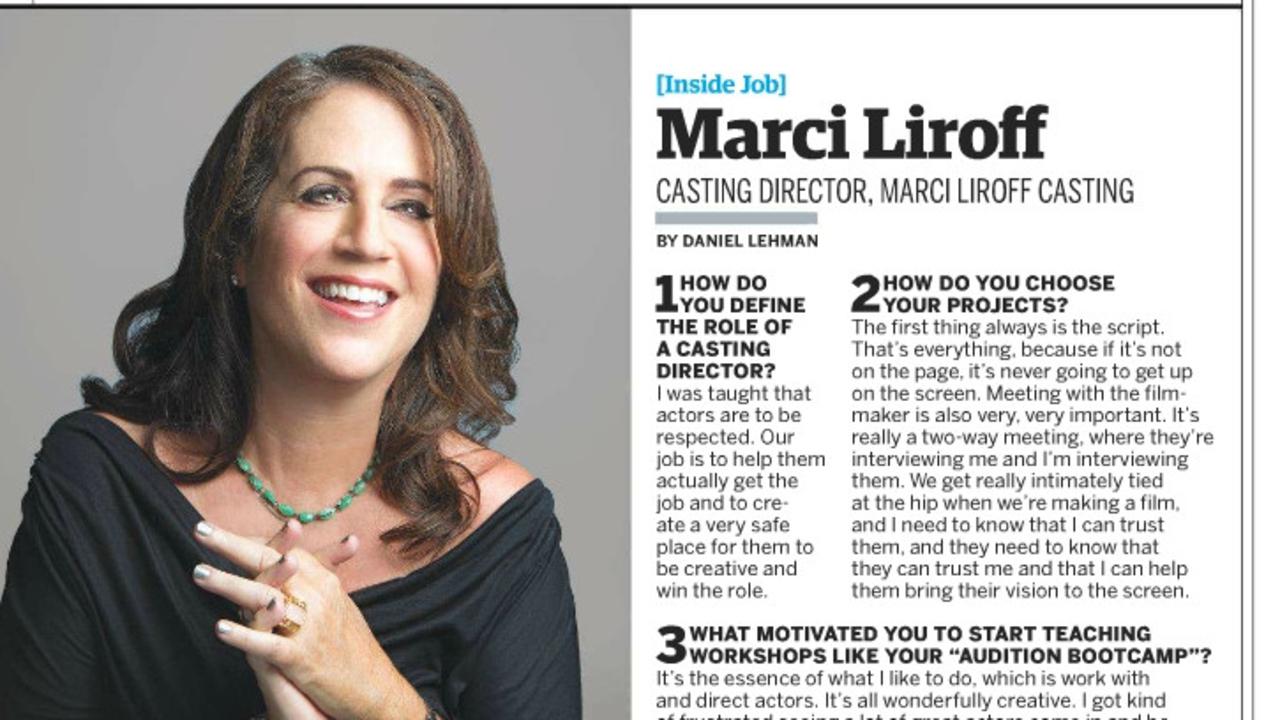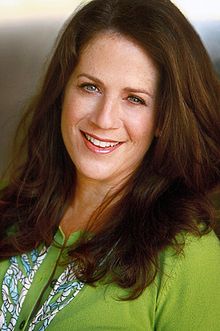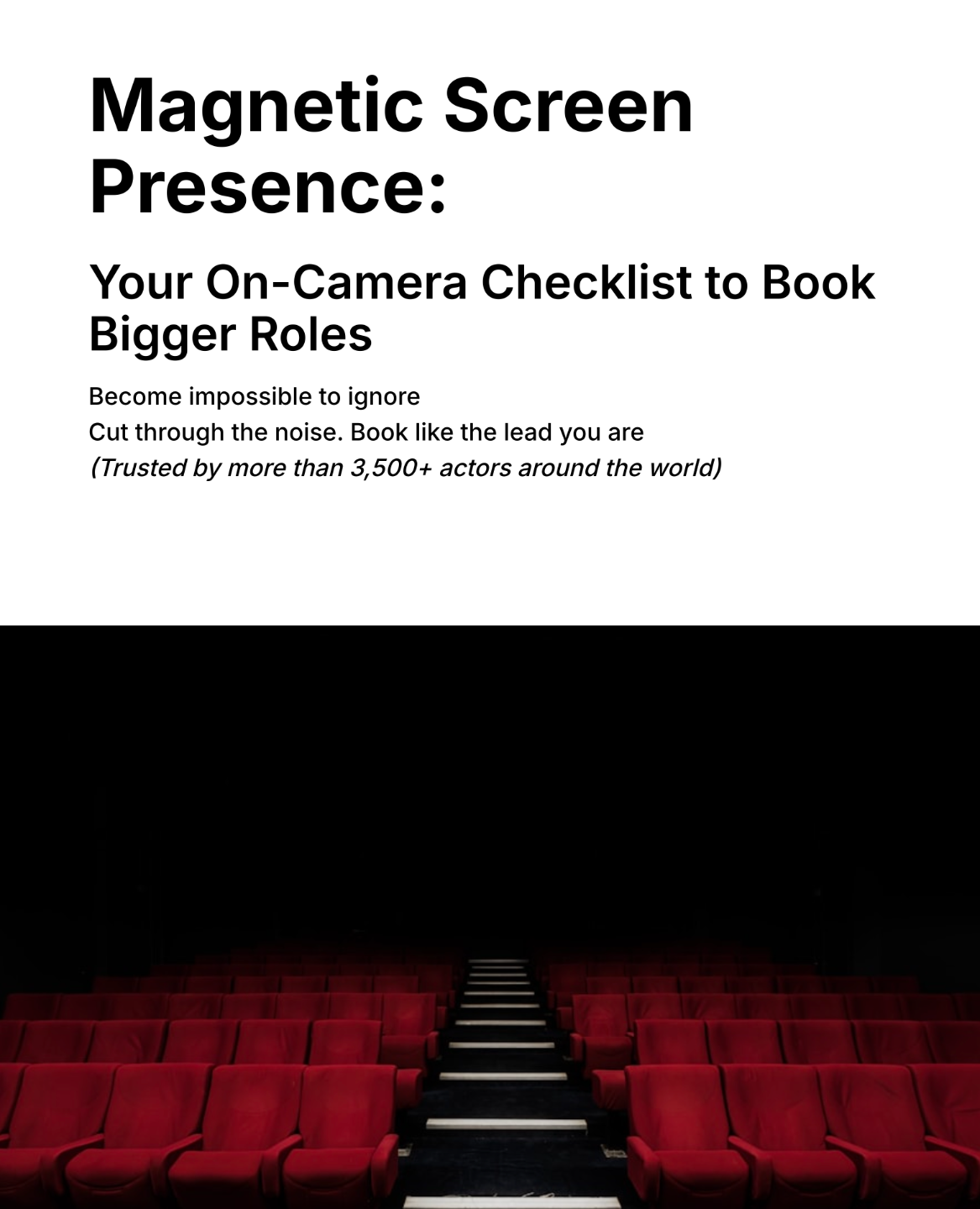Marci Liroff Casting Director
Mar 12, 2016
Casting Director Marci Liroff

(I love this article - Marci hits the nail on the head - your language is critical especially your internal dialogue - be aware of what you say to yourself inside your mind)
In case you are not aware.... here is a small selection of what Maric Liroff has been casting...
Are These Thoughts Poisoning Your Abilities?
Do you think the following thoughts and utter these phrases to describe yourself and others? “I’m a hungry actor.” “He’s a starving artist.”
Do you describe those that hire you as “gatekeepers” or “those on the other side of the desk”?
Watch your mouth. Watch your thoughts. Watch the loop going on in your head that’s tearing you down.
Words matter! Change your dialogue.
Banish these terms from your lips and your brain. These thoughts are pervasive. When you speak them aloud you give them life and energy. I have actor friends who refer to themselves as “starving artists” while trying to maintain a supposedly tongue-in-cheek attitude. Even if they’re joking, it plants a seed in people’s minds that artists have to starve and struggle for their work. The words and phrases tend to romanticize the life of an artist, implying there has to be pain and lack of comfort to attain true art.
In my article “This Will Change Your Life,” I asked you to reframe the way you’ve been thinking about meetings and auditions. I wrote about thinking of the whole auditioning process as a collaboration between filmmakers.
I also suggested that you’ve got to stop the deadly “me against them” loop. Delete the word “gatekeepers” and anything else that you think is standing in your way. Replace it with this mantra: “I am a filmmaker! I am a collaborator!”
Another self-sabotage move is the idea of luck. What is luck? Some have it and some don’t. Really? If luck exists, why do I even need to get up in the morning? My luck will take care of everything. No need to even insert myself into the equation because it’s out of my hands. I call bullshit on this with a big cherry on top.
I don’t believe in luck. Some say luck is what happens when preparation meets opportunity. This quote, attributed to Roman philosopher Seneca, reminds us that we make our own luck.
As I always preach, perception is 90 percent of the game. As an artist and performer with so many things out of your control, the one thing you do have control of is your perception and how you let things plant firmly in your brain or let them go. Are you going to stick with the voice in your head that says, “I never get comedy jobs”? Or are you going to change your “luck” and start viewing your opportunity in a different light? Take ownership of this opportunity and get yourself into some sitcom and improv classes. Turn your “bad luck” on its ear.
Psychologist Richard Wiseman did a 10-year study on the topic of luck. In interviews with the study’s volunteers, he realized that unlucky people are typically more anxious and tend to be more hyperfocused on the specifics of a situation. Lucky people, on the other hand, are more laid-back and open to whatever opportunities present themselves.
His research revealed that lucky people generate good fortune via four basic principles. They are skilled at creating and noticing chance opportunities, making smart (“lucky”) decisions by listening to their intuition, creating self-fulfilling prophecies via positive expectations, and adopting a resilient attitude that transforms bad luck into good.
When you take control of what you think and say, I guarantee a change. The universe is listening.
Like this advice? Check out more of Marci Liroff's articles!
Known for her work in film and television, producer and casting director Marci Liroff has worked with some of the most successful directors in the world such as Steven Spielberg, Ridley Scott, Mark Waters, Christopher Nolan, Brad Bird, and Herbert Ross. While working at Fenton-Feinberg Casting, she, along with Mike Fenton, cast such films as “A Christmas Story," “Poltergeist," “E.T. – The Extra Terrestrial," “Indiana Jones and the Temple of Doom," and “Blade Runner." After establishing her own casting company in 1983, Liroff cast “Footloose," “St. Elmo's Fire," “Pretty in Pink," “The Iron Giant," “The Spitfire Grill," “Untamed Heart," “Freaky Friday," “Mean Girls," “Ghosts of Girlfriends Past," “Mr. Popper’s Penguins,” “Vampire Academy,” and the upcoming “The Sublime and Beautiful,” which she produced as well.
Liroff is also an acting coach, and her three-night Audition Bootcamp has empowered actors to view the audition process in a new light. The class spawned an online course available at Udemy entitled "How To Audition For Film and Television: Audition Bootcamp."
Visit Liroff online at marciliroff.com follow her on Twitter @marciliroff and Facebook, and watch her advice videos on YouTube. You can also read her blog.
Still Stuck?
Want to join my facebook group for free?
Or...do you want to take your career to the next level?
Or..do you really want to change things and fly with the eagles?
Nothing but Proper Prep Work Will Ready You for the Audition Room’s Curveball!
 I know, I know. It’s been quite a while since I’ve blogged! But, I’m back!
I know, I know. It’s been quite a while since I’ve blogged! But, I’m back!
If you’re in Los Angeles in June, I’m teaching my 3-night Audition Bootcamp classes. Click here for more info. Class is almost full so be sure to take advantage of the 10% offer if you sign up before 5/20/19.
In the meantime – here’s my latest blog.
One question I’m consistently asked as a casting director is “What is your biggest pet peeve with actors and auditions?” My answer is in line with most of my colleagues: lack of preparation.
What exactly is preparation? What do casting directors and the filmmakers consider good, solid preparation? Let me break it down for you by telling you a story about a coaching client of mine.
My client got a big break to go in and audition for a role in a television series that was being recast. He was so excited for the opportunity, only to be cut off at the knees because his manager let it slip that none of the producers wanted to see him for the role. The casting director strongly believed in him and made it her mission to give him the opportunity to at least read. The script was great—the kind where the dialogue just rolls off your tongue.
You’ve just got to get out of your own way, know the material inside and out, and make some solid character choices.
Since my client was not in Los Angeles, we worked on the scene using Skype for a solid week. We’d work for about two hours each day, discussing his character, the story, and how he fit into it. The scene was meaty, so there was a lot of good stuff to dig into. Throughout the week, we’d read through the entire script, even scenes he wasn’t in so that he could become immersed in that world.
Audition day finally came, and he was pumped. He read on tape for the casting director, and she was truly impressed—then she brought out a second scene. My client gulped; his agent had only given him the one. “There are two scenes,” the CD clarified. “And the second one is even better! How about you take a look at it in the hallway and we’ll just try it anyway?” My client didn’t miss a beat.
He didn’t even leave the room; he looked over the “new” second scene (which we had gone over at least a dozen times over the course of the week) and was ready. “Let’s do it.” He read the second scene in the room and wowed yet again. He walked out, head held high, and called his agent to chew him out for not adequately preparing him. Turned out it had been a miscommunication between offices.
But then he called me. “Marci,” he said, “when she handed me the new scene, I started to panic, but then I remembered that we had gone over this so many times. I was totally ready for this.”
And here’s why I’m using this story to illustrate what preparation can cover. Next, he said, “Here’s the thing: I’m in the best shape of my life right now; I’m on a daytime talk show; I’m in a Broadway show eight times a week. My brain will never be sharper than it is now. My body is engaged and worked out like an athlete because of all that I’m doing every day. I truly amazed myself at how easily I slipped into this second scene and didn’t freak out.”
Your work and your preparation is not just for a specific audition or job. It’s daily. You wouldn’t run a marathon without training months to get there, and it’s truly the same with acting. You need to be in acting class as your foundation and build from there. You can’t just take camera and audition classes. You’ve got to watch lots of movies and television so that you can study the work.
Read, research, go to the gym. Most importantly, you must live a rich life so you can have something to draw from in your acting. My client didn’t get the job, but the producer and director fell in love with him and wrote him a recurring role in the series. They continue to work together to this day. Now that’s what I call preparation!
Make sure to check out my online course “How To Audition For Film and Television: Audition Bootcamp”. You can view it on your laptop or your mobile device and your subscription gives you lifetime viewing privileges for this course. I’ll be adding lectures throughout the year.
Warning: I grant permission to share my blog as written with no additions or deletions. Posting my blog is in no way an endorsement of another site unless you obtain my written consent.)
Like this story? Help to spread the word. Click to tweet.
FREE Self Taping Training - Click on The Pic Below
How to avoid the one note performance
Have you ever worked on a scene and given it your all, only to get the comment “Eh, it felt very one-note”? What does that even mean? It reminds me of the iconic scene in “Amadeus” when, after Mozart plays his new composition, the emperor responds, “Too many notes.” How many notes is too many? How many is too few?
Let’s say you have a scene where you find out your boyfriend is cheating on you. What I often see in auditions is actors playing one emotion; let’s choose anger. Think about it for a moment: If you found out your significant other was being unfaithful, you would probably have a deep well of many emotions—betrayal, loss of trust, embarrassment, resentment, shame, paralysis, disbelief. Why play only anger? Beyond the fact that it’s boring to watch, it’s not how you’d act in real life.
When you play the scene, we want to see all the colors wash over you. Even if it’s a short-lived moment, there’s so much you can play between the lines. Every bit of information that your partner is giving you should result in a different expression of emotion. Yes, they can all be rooted in anger, but there are so many different ways to show it—it shouldn’t be your interpretation’s only driving force.
Finding all the possible emotions will make your performance more nuanced and rich.
As an exercise, write down all the possible responses to the action of your scene in the margin of the script. Try to play them all until you find the most authentic and honest reactions.
That said, if you’re all over the place emotionally (“too many notes”) we’ll find it hard to follow you because your performance will feel unfocused. The audience is most moved when they can latch onto something and relate to you. And there’s a fine line between losing yourself in a scene and a sloppy performance.
This is where rehearsing with a partner before your audition is vital. I can always tell when an actor comes in to audition for me and they haven’t read the scene with another human being yet. Your audition should not be the first time you’re reading these words aloud with a scene partner.
Rehearsing with another person will help you in several ways. First, there is a natural conversational rhythm within the scene that you can’t find unless you read it with someone else. You also need to find the moments between the lines and between the words that will elicit genuine emotion. You can’t do that on your own in a vacuum.
I recently found a great website, WeRehearse.com, where you can set up your profile for free, then hire someone to run lines with you before an audition. That person can even be your scene partner when you self-tape. I wish I’d thought of it!
Make sure to check out my new online course “How To Audition For Film and Television: Audition Bootcamp”. You can view it on your laptop or your mobile device and your subscription gives you lifetime viewing privileges for this course. I’ll be adding lectures throughout the year.
Warning: I grant permission to share my blog as written with no additions or deletions. Posting my blog is in no way an endorsement of another site unless you obtain my written consent.)
Like this story? Help spread the word.
Get exclusive training updates, powerful acting breakthroughs, and actor-friendly discounts—straight to your inbox
No spam. No fluff. Just real tools to help you book more work, faster
Join the list. Stay in the game.
Stay connected with news and updates!
Join Nick's mailing list to grab the latest news and updates from me and my team.
Don't worry, your deets will NEVER be shared.
We hate SPAM. We will never sell your information, for any reason.



